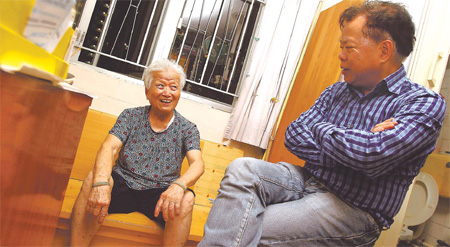Bid to make the way to heaven smooth
Volunteers help lonely pensioners have a dignified send-off. The photograph on top of the altar at the Diamond Hill memorial hall was of a lonely pensioner surnamed Siu.
 |
|
Law Ying, 81, shares a joke with Peter Nip Yeung-shing, chairman of the Banyan Elderly Services Association in Hong Kong. Law is one of hundreds of residents in the city who have been getting help from the nonprofit group, which assists single and widowed elderly people to prepare for their final stages of their lives, including organizing their funerals. |
His funeral had been a simple and silent affair. No religious rituals were performed, no relatives and friends were sobbing in the aisles, and no eulogy was read.
The only mourners who arrived to bow and burn incense, before the casket was taken away for cremation, were five people who had never actually met Siu - all of them volunteers from the Banyan Elderly Services Association (BESA), a nonprofit group that helps single or widowed elderly people in Hong Kong.
In southern parts of China, the banyan tree, with its large, glossy green leaves, is a symbol of long life. It was chosen by the group as part of the organization's name as the tree complements its mission to provide protection for elderly people, shading them from the problems they face in the final stages of their lives.
Chinese people traditionally do not like to think about death, let alone plan for it. Yet for those with no family, one of the greatest fears is dying alone, with no one to take care of the funeral arrangements.
That is where the BESA comes in. Since launching the Friends of Sunset project in 2007, it has been helping lonely pensioners "pass with dignity".
With six core members, known as "pre-need caretakers", the group handles everything from identifying the body to organizing the funeral to the client's specifications, which are agreed by contract.
Other social welfare organizations in Hong Kong also provide similar services, with most performed by licensed undertakers. What distinguishes the BESA, says its chairman Peter Nip Yeung-shing, is the quality of care.
"We're more like the client's family," Nip told China Daily, explaining that his staff members make regular visits to the columbarium and cemeteries to pay their respects.
It takes seven working days for his volunteers to take over the "after-death process", which begins with a call from the police or hospital, followed by a visit to the mortuary and then Diamond Hill to set a date for the funeral and cremation.
Volunteers also apply for a death certificate from the Births and Deaths General Register Office in Wan Chai.
"Once all the bookings are made, our staff members start arranging the funeral based on the requests of the deceased," said Nip. "Volunteers will gather to pay their final respects on the night of the funeral, with the body cremated the next day."
 0
0 






